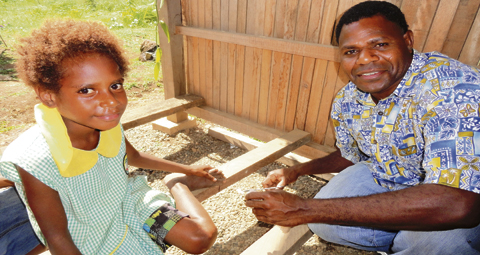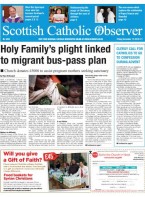June 6 | ![]() 0 COMMENTS
0 COMMENTS ![]() print
print

Following in the footsteps of Jesus
MISSION MATTERS SCOTLAND explains how it is working tirelessly in dioceses in Papua New Guinea to meet the needs of the people in them and spread the Gospel message throughout the country
In October 2013, Pope Francis said: “My concern for all the churches, that I share with my brother Bishops, can be seen clearly in the work of MISSIO (Pontifical Mission Societies). MISSIO is called to enable Christians to offer their prayers and their help to spread the Gospel in the world.”
Mission Matters Scotland is the Scottish branch of the Pontifical Mission Societies [MISSIO] and is the official mission aid agency of the Catholic Church, continuing the mission of Jesus Christ in the world. Mission Matters reaches out, gives life and calls all people in the world to faith, justice and love, operating in over 180 countries to support initiatives in 1100 dioceses on five continents.
Local needs are identified in mission dioceses to give people the opportunity for a full, enriched life—physically and spiritually— regardless of race, stigma, religion or gender.
Papua New Guinea (PNG) is one example of how the Pontifical Mission Societies support communities, support leadership training and help children by speaking the Word, caring for people in need and acting for justice and creation.
In Papua New Guinea in the Diocese of Wabag, located in the rugged environment of the central highlands, where most settlements lie between 1500 and 2500 metres above sea level, the Pontifical Mission Socities are helping the local church in a variety of ways—undertaking outreach activities such as pastoral and social work, as well as family counselling, health care and educational development.
The diocese has 198 Catechists from the age of 18 to 38, who work hard to proclaim the Gospel and bring transformation to the lives of the people throughout Wabag’s 17 parishes.
The generous support of our donors funds formation activities and provides a small allowance to the Catechists. Catechists are essential to this work because most parishes are situated in remote mountains and villages.
Every year formation is provided to catechists through disciple schools, retreats and workshops, in partnership with the local people who also contribute money, material and gifts in kind to help the catechists do their work.
A typical day for these pastoral agents involves taking part in daily Mass and meeting with the parish priest afterwards, providing religious instruction for Baptisms, visiting outstations for instruction and Communion, family prayer and fellowship at night with the Christian community.
One of the Catechists is 35-year-old Titus Mak from the Sangurap parish. Married with five children, he was educated to grade six level before returning to his remote village. After showing an interest in pastoral work, the local priest identified him as having the potential to be an outstanding catechist and funding was provided to support his catechetical training.
Titus works full-time for the work of the church in his village, and the small remuneration he receives for his Catechism work helps feed his large family and allows for his children to be educated. Thanks to his role with the Catholic Church, the future of Titus’s family looks bright because the children are able to go to school and are hoping to train for a professional career so that they can have a good income. They are always thankful for the role the Catholic Church plays in their community and Titus and his wife are hoping that at least one or two of their children follow in Titus’s footsteps by doing pastoral work or even becoming a priest or a nun.
Funding paid for the construction of a presbytery for the parish of Mariant, which, established in 1962, is one of the most remote parishes in the Wabag Diocese. This parish is situated approximately 10,000 feet above sea level and the climate is very cold. The parish consists of 4661 Faithful Catholics.
Previously, the parish house was made out of organic bush materials and was used by different parish priests for almost 50 years. However, this simple home was not suitable due to the cold weather conditions and general wear and tear, so with funding, the parish community was able to construct a new parish house to be used by the parish priest, seminarians, religious people and pastoral workers when they visit the area for training. The local community, always proud of their Catholic leaders, actively participated in the construction of the parish home, contributing some money, as well as timber and labour.
Stephen Puio, a 23-year-old seminarian was recently posted to the Mariant parish to do his pastoral experience with parish priest Reverend Aaron Sakan. Thankfully, Stephen is able to stay at the parish house during his time in Mariant. The parish desperately needs pastoral workers, and Stephen’s presence and assistance has been of vital importance and help to Fr Sakan with their work in pastoral activities, non formal education, retreats and communion services.
Our donors’ generosity supports the training of priests, brothers and sisters throughout the world, so they can follow their calling. These men and women play an essential role in establishing a network of trust and love with local communities, which is particularly essential in many developing countries where sharing the Gospel and the Catholic Faith is scarce, such as in Papua New Guinea.
With more than 1000 tribes across PNG, conflicts over such things as land claims and religious differences continue to cause widespread grief. The Catholic Church and local priests play an important part in reducing the hostility and animosity between the tribes. As respected leaders of the community, the priests act as mediators and encourage harmony and reconciliation.
One future PNG priest is Elias Zambria—a 26-year-old seminarian from the Mendi Diocese in the southern part of PNG. Like many of his fellow seminarians at the Holy Spirit Seminary in Port Moresby, Elias has experienced tribal conflict first-hand in his home village. He knows the important role the Catholic Church is playing in reducing tribal conflict throughout PNG, as well as the crucial work of the Church in areas such as evangelisation and building schools and hospitals.
Elias first experienced his call to priesthood when he was just 16-years-old. However, after finishing school, he started working as an auto-electrician and slowly drifted away from his once strong Faith. With the help and guidance of his grandmother, Elias returned to the Church and decided to follow his calling. He is now in his second year of study and is aspiring to become a seminary lecturer, so that he can help others on their journey to priesthood.
In preparation for priesthood, Elias and his fellow seminarians are already reaching out to the people of PNG, offering not only spiritual support, but also practical support. Every week, Elias helps the Canossian Sisters provide basic health care to people on the outskirts of Port Moresby who, because of their extreme poverty, are unable to afford the high fees in the city hospitals. Elias and his brothers are assigned to different areas and have different responsibilities, such as leading prayer, providing health education and medication, distributing nutritious food and weighing patients. Priority is given to children who are often sick with coughs, influenza, malaria, diarrhoea, headaches, fever or sores.
Elias really enjoys the pastoral work; for him it is a unique opportunity to meet the people, help them and be with them.
“It prepares and equips me with practical experiences to be an effective pastoral worker as a priest in the future universal Church of Christ,” he said. “It helps me to know how best to work with people who are poor and underprivileged by reaching out to them with the help of the Lord and showing His love and compassion.”
In the developing world, countless parents and carers struggle to provide the basic needs for their children—such things as food, medicine, education and shelter are luxuries for some. Through our supporters, thousands of crucial local initiatives, which specifically benefit children under the age of 15, receive essential funding. Such things as schools, health and nutrition programs, orphanages and rehabilitation centres are supported. These programs enable children to develop their physical, social, emotional and spiritual well-being, thus engaging in a holistic approach to child development, and additionally assisting whole families in desperate need.
Junior, 13, lives with his grandmother in Simbu, a remote Papua New Guinean province. Abandoned by his parents when he was an infant, his older brother supports him and his grandmother by carrying bags of sweet potatoes at a local market. Although living in poverty, Junior is able to access free healthcare, thanks to the efforts of Fr Arnold Schmitt and Sr Henriquetta Muchate.
With your support, Fr Schmitt, Sr Henriquetta and the sisters of St Mary’s Catholic Cathedral have started a mobile health clinic, which provides medical treatment and spiritual outreach to the poor of their diocese. In just the last year, they’ve treated 6092 children in 44 communities. Their treatment includes providing a free health record book, which, for many children, is the only record of their date of birth, vaccinations and other medication. As Sr Henriquetta explains, this information is vital to their work.
“In the elementary schools, having such records not only allows us to provide the Tetanus Toxoid vaccine, but also to combat anaemia and heart problems,” she said.
Approximately 220,000 inhabitants live in urban dwellings within the Lae Diocese, where there is no electricity or clean drinking water. Due to this, families often store rain water in rusty drums, which poses serious health problems.
“The hygiene here is terrible, and tuberculosis is rampant,” Fr Arnold said. “Many of the markets near settlements are particularly dirty.”
Sadly, many of the diseases that the team treat are preventable. Through their tireless efforts at the mobile health clinic, the team are doing their best to lower the country’s mortality rate where, currently, fifty-eight children out of every 1000 die before their fifth birthday. This means that more children will now have a chance, like Junior, to enjoy longer childhoods and, hopefully, brighter futures.
As Pope Francis reminds us, the young Church in Mission areas needs our help and support to grow. By supporting Mission Matters Scotland in its work worldwide to support communities and leadership and help children and families, you are following the words of Jesus: “Just as you did it to one of the least of these… you did it to me.”
Mission Matters Scotland is the working name of MISSIO Scotland. Mission Matters Scotland is the only organisation to guarantee
support for every one of the 1100 mission dioceses in the world. To support Mission Matters Scotland call: 01236 449774 or e-mail: [email protected]
n www.missionmattersscotland.org










